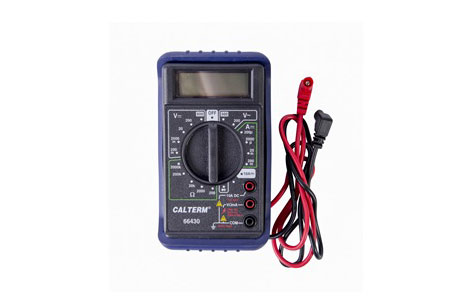What Are Multimeters Used For?
Key Takeaway
Multimeters are used to measure voltage, current, and resistance in electrical circuits. They are essential tools for troubleshooting electrical problems, testing components, and verifying circuit functionality. Whether you’re an electrician or a DIY enthusiast, multimeters help identify issues like faulty wiring or dead batteries.
They are commonly used for testing wall sockets, batteries, power supplies, and electrical devices. Multimeters also check continuity to ensure circuits are complete and safe. In industrial settings, they are vital for maintaining machinery and monitoring electrical systems. Their versatility makes them a must-have for anyone working with electronics.
Household Applications of Multimeters
Multimeters are incredibly handy for household tasks, offering solutions to common electrical problems. From checking wall sockets to testing batteries, they simplify home maintenance tasks. Imagine plugging in your device, and it’s not working—before replacing it, you can use a multimeter to test if the socket is providing electricity.
Another common use is testing batteries for remotes, flashlights, and toys. By measuring their voltage, you can determine whether they need replacement. Multimeters can also check if a lightbulb is defective or a circuit breaker has tripped.
For DIY enthusiasts, multimeters open the door to exploring small electronics. Testing the functionality of home appliances like fans or heaters becomes straightforward with this tool. Their compact size and ease of use make them an essential part of a home toolkit.
These household applications not only save time but also reduce costs by enabling quick problem-solving without professional help. It’s a simple way to ensure safety and efficiency in your daily life.

Automotive Troubleshooting with Multimeters
In the automotive world, multimeters are indispensable. Vehicles rely heavily on electrical systems, and when something goes wrong, a multimeter can pinpoint the issue quickly. For instance, you can test the car battery’s voltage to ensure it’s charged and ready to power your vehicle.
Troubleshooting alternators is another critical use. A multimeter helps confirm whether the alternator is charging the battery properly. You can also diagnose issues with wiring, such as broken circuits or poor connections in the lighting system.
Another valuable function is testing sensors like those in the engine’s control system. Modern cars have intricate electrical components, and identifying faults without a multimeter can be like searching for a needle in a haystack.
By identifying electrical faults efficiently, a multimeter saves mechanics and car owners significant time and money. Whether you’re a seasoned mechanic or a beginner learning about car maintenance, this tool is a game-changer.
Industrial Testing and Maintenance
In industrial environments, multimeters are workhorses. They ensure machines run smoothly and efficiently, minimizing downtime. For example, they help check motor circuits, ensuring they’re receiving the correct voltage and current.
Multimeters are also used to test transformers and measure their output. Any deviation can indicate a potential issue that could escalate if left unattended. Testing power supply units and monitoring load conditions are other essential tasks.
Industrial machines are often complex and expensive, so proactive maintenance with a multimeter is critical. You can test circuit boards, ensuring they operate within specified parameters.
Furthermore, safety is paramount in industrial settings. Multimeters help verify grounding and prevent electrical hazards, safeguarding both employees and equipment. These applications highlight why multimeters are a cornerstone of industrial maintenance and troubleshooting.
Educational and Training Uses
Multimeters are also excellent educational tools. For students studying electronics or electrical engineering, they provide hands-on experience with real-world circuits. Learning how to measure voltage, current, and resistance with a multimeter is foundational for understanding electrical systems.
Instructors use multimeters to demonstrate concepts like Ohm’s Law and circuit behavior. By measuring components in a live circuit, students can see theoretical concepts come to life. It’s an engaging way to build practical skills while reinforcing classroom learning.
Beyond classrooms, training programs for electricians and technicians heavily rely on multimeters. Trainees learn to test systems, diagnose problems, and ensure equipment meets safety standards. These experiences prepare them for real-world challenges.
Multimeters make learning interactive and practical. Whether you’re a student, teacher, or professional in training, mastering this tool is a step towards electrical expertise.
Specialized Applications in Research
In research and development, multimeters play a pivotal role. They’re used to measure and monitor electrical parameters in experiments, ensuring accuracy and reliability. For instance, in electronics research, multimeters help test prototypes and fine-tune circuit designs.
In renewable energy studies, they measure parameters like current and voltage in solar panels or wind turbines. Ensuring these systems work efficiently requires precise testing, and multimeters provide that precision.
Biomedical engineering is another area where multimeters are crucial. Testing and calibrating medical devices, such as pacemakers or diagnostic equipment, relies on accurate measurements.
Research demands precision and reliability, and multimeters deliver on both fronts. They empower researchers to push boundaries, ensuring their innovations are backed by accurate data and robust performance.
Conclusion
Multimeters are versatile tools that find applications across various fields. From fixing household issues to maintaining industrial equipment, troubleshooting vehicles, teaching concepts, or advancing research, they prove invaluable. Mastering their use can save time, improve safety, and enhance efficiency in any electrical task.
Whether you’re a professional or a beginner, having a multimeter in your toolkit is a smart move. It’s the key to solving electrical mysteries with confidence.

